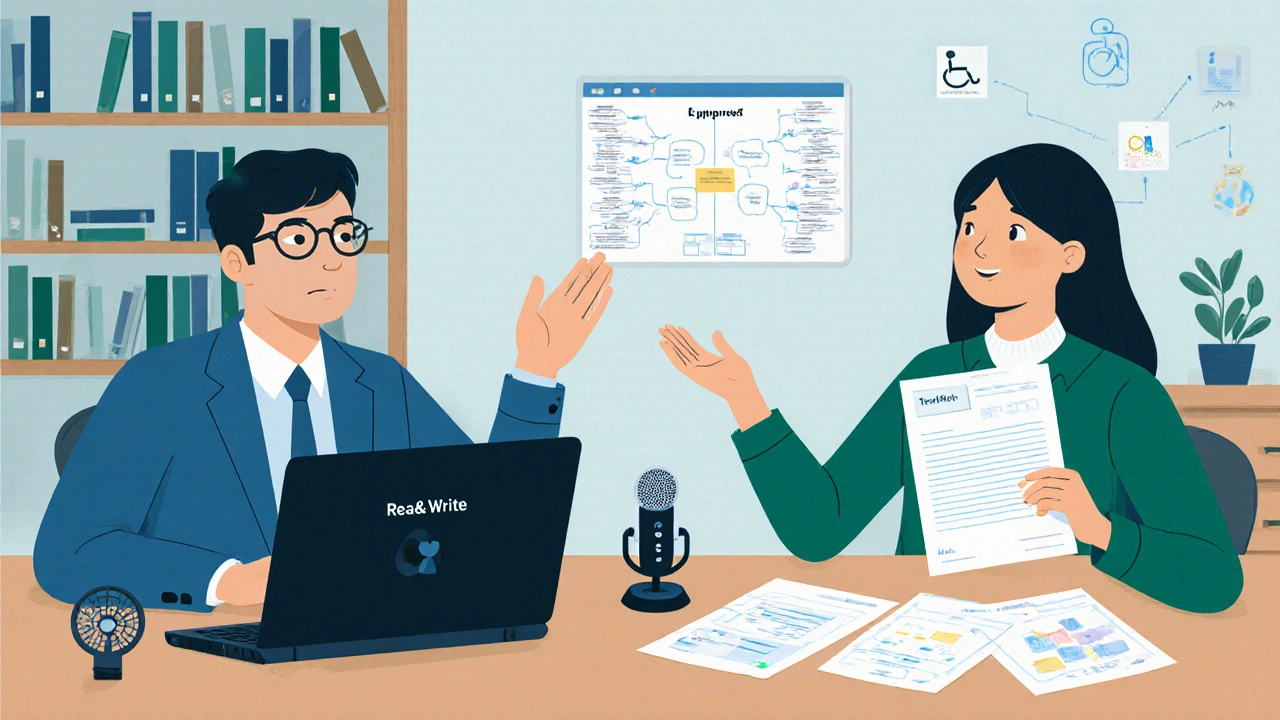
What dyslexia support looks like at UK universities today
If you have dyslexia and are starting university in the UK, you’re not alone. Around 10% of the population has dyslexia, and universities have spent years building real, practical systems to help students succeed. This isn’t about pity or extra time just because it’s fair-it’s about removing barriers so your brain can show what it’s really capable of. Whether you struggle with reading dense textbooks, taking notes in lectures, or writing essays under pressure, UK universities now offer structured, legally backed support that actually works.
Unlike high school, where help might be patchy or inconsistent, universities in the UK are required by the Equality Act 2010 to make reasonable adjustments. That means if you’re diagnosed with dyslexia, the university must provide tools and services tailored to your needs. You don’t need to be perfect at asking for help-you just need to start the process early.
How to get support: step by step
Getting help isn’t complicated, but timing matters. Most students wait until they’re struggling before acting. That’s too late. Here’s how to do it right:
- Get a formal diagnosis. If you were never assessed as a child, you can still get one now. Many universities partner with local educational psychologists who specialize in adult dyslexia assessments. Costs are often covered by the Disabled Students’ Allowance (DSA).
- Apply for the Disabled Students’ Allowance (DSA). This is government money-not a loan-that pays for tech, tutors, and other support. You apply online through Student Finance England, Wales, Scotland, or Northern Ireland, depending on where you live.
- Book a Needs Assessment. Once your DSA application is approved, you’ll meet with a specialist who looks at your study habits, reading speed, note-taking style, and tech preferences. They don’t just hand you a list-they build a plan.
- Receive your equipment and services. This could include a voice-to-text program, a digital recorder, a specialist tutor, or even a note-taker who attends lectures with you.
- Check in every term. Support isn’t a one-time thing. Your needs might change. Talk to your disability service regularly.
Many students don’t realize they’re eligible until they see someone else using a speech-to-text tool or getting extra time on exams. Don’t wait for permission to ask. The system is designed for you to use it.
What kind of help do you actually get?
Support isn’t one-size-fits-all. What works for one student might not work for another. Here’s what’s commonly provided:
- Assistive technology: Software like Dragon NaturallySpeaking is a voice-to-text program that lets students dictate essays instead of typing. Others use TextHelp Read&Write is a toolbar that reads text aloud, highlights keywords, and helps with spelling and grammar. Many universities give these tools for free.
- Extra exam time: Most students get 25% extra time on timed tests. Some get 50% if they have slower processing speeds. You also get rest breaks and quiet rooms if noise distracts you.
- Specialist tutoring: These aren’t general study tutors-they’re trained in dyslexia. They help you break down essay questions, organize ideas visually, and build memory strategies. One student told me her tutor helped her turn lecture notes into mind maps instead of paragraphs. That changed everything.
- Note-takers: If writing while listening is overwhelming, you can get a peer note-taker. They share their notes with you after class. Some universities even provide lecture recordings.
- Alternative formats: Textbooks can be converted into audio files or easier-to-read formats. PDFs are reformatted with dyslexia-friendly fonts like OpenDyslexic. Some departments even offer summaries of core readings.
One thing to know: you won’t get a personal assistant. You won’t have someone doing your work for you. But you will get tools that let you do the work yourself-faster, with less stress, and without the shame of feeling "behind."
Real examples: what works in practice
At the University of Manchester, a student named Sam struggled with reading journal articles. He’d spend hours on a single page, losing track of what he’d read. After his Needs Assessment, he was given a screen reader and a subscription to Kurzweil 3000 is a learning software that highlights text, defines words, and creates study guides. He started using it with his course readings. Within weeks, his reading speed doubled. He went from barely passing to earning a first-class degree.
At King’s College London, another student used a digital recorder in lectures. She’d listen back later, pausing and rewinding when she missed something. She also got a specialist tutor who helped her structure her essays using visual templates. She didn’t write more words-she wrote better ones. Her final dissertation got top marks.
These aren’t rare cases. They’re routine. Universities track outcomes now. A 2024 report from the Higher Education Funding Council for England showed that students with dyslexia who used DSA support were 34% more likely to graduate with a 2:1 or higher than those who didn’t access support.

What you shouldn’t expect
There are limits. Support is about leveling the playing field, not changing the rules. You won’t get:
- Extensions on deadlines just because you’re busy. You can request them if you have a flare-up or medical issue, but not as a standard.
- Grades lowered. Your work still has to meet the same academic standards. The help gives you the tools to reach them.
- Guaranteed passes. Dyslexia doesn’t excuse poor effort. But it does mean you won’t be punished for how your brain processes information.
- Private tutoring paid for outside the university. All funded support must go through the official DSA process.
Some students think asking for help means they’re weak. That’s the myth universities are trying to break. The truth? The students who succeed are the ones who use the tools. Not the ones who pretend they don’t need them.
What to do if you’re not getting help
Not every university does this well. Some disability offices are understaffed. Some staff aren’t trained enough. If you feel ignored:
- Ask for a meeting with the Head of Disability Services. Don’t settle for an email reply.
- Bring your DSA award letter and your Needs Assessment report. Show them what you’re entitled to.
- If you’re still stuck, contact your Students’ Union. They have advocates who know how to push back.
- For serious cases, you can file a complaint through the Office of the Independent Adjudicator for Higher Education (OIA).
Most issues get fixed quickly once someone in charge is aware. Don’t let bureaucracy silence your needs.
How to talk to your professors
You don’t have to explain your dyslexia to every lecturer. But if you want accommodations like extra time on assignments or alternative formats for reading lists, you’ll need to give them a copy of your DSA letter. Most universities provide a standard form for this.
Here’s a simple script: "I have a diagnosed learning difference that affects how I process written material. I’ve been approved for extra time and assistive tech through the DSA. I’ve attached my letter. If you have any questions, I’m happy to explain."
Professors aren’t mind readers. If they don’t know you need help, they assume you’re fine. A short, clear message removes the guesswork.

What students wish they’d known sooner
Students who’ve been through it say the same things:
- "I waited until my second year to apply for DSA. I lost months of productivity. Apply in your first term."
- "I thought I had to be bad at writing to qualify. I didn’t realize even strong readers with slow processing could get help."
- "I didn’t know I could get a laptop with special software. I thought I had to buy it myself."
- "I was scared people would think I was cheating. Turns out, everyone knows someone who uses these tools."
The biggest mistake? Thinking you’re alone. You’re not. You’re part of a system that’s been built to help you-not to fix you, but to let you thrive.
What’s next after university?
Dyslexia doesn’t disappear when you graduate. But the tools you learn in university become lifelong skills. Many students keep using their voice-to-text software at work. Others use mind mapping apps to plan projects. Some join professional networks like the Dyslexia Association for ongoing support.
Employers in the UK are also required to make reasonable adjustments under the same Equality Act. If you’re hired, you can ask for the same tools you used at university-speech-to-text, flexible deadlines, or screen readers. You don’t have to hide it. In fact, many companies now actively recruit neurodiverse talent because they bring different ways of thinking.
University isn’t the end of your support journey. It’s the start of learning how to advocate for yourself in the real world.
Do I need a formal diagnosis to get help at university?
Yes. You need a report from a qualified specialist-like an educational psychologist or a certified dyslexia assessor. If you were never assessed before, your university can help you find a provider. The cost is usually covered by the Disabled Students’ Allowance (DSA).
Can I get help for dyslexia if I’m an international student?
Yes, but you’re not eligible for the UK government’s DSA unless you’re a UK resident or have settled status. However, most universities still offer free in-house support like assistive software, note-takers, and tutoring. Contact your disability service directly to find out what’s available.
Will my professors know I have dyslexia?
Only if you choose to tell them. Your diagnosis is confidential. You’ll receive a letter from the disability service that you can share with lecturers to confirm your accommodations-like extra exam time-but it won’t say you have dyslexia unless you ask them to include it.
What if I’m not sure I have dyslexia?
Many universities offer free screening tests for students who suspect they might have dyslexia. These aren’t formal diagnoses but can point you in the right direction. If the screening suggests dyslexia, you can then pursue a full assessment. Don’t wait until you’re failing-get checked early.
Can I get help with math or statistics if I have dyslexia?
Absolutely. Dyslexia can affect how you process numbers, remember formulas, or read word problems. Support can include extra time on math exams, access to number-line apps, audio explanations of concepts, and tutors trained in numeracy difficulties. Many universities now offer specialist maths support for neurodiverse students.
Final thought: You’re not broken
Dyslexia isn’t a flaw. It’s a different way of thinking. The people who thrive in university with dyslexia aren’t the ones who try to be "normal." They’re the ones who use the tools, ask for help, and build systems that work for their brains. The UK university system gives you the chance to do that. All you have to do is reach out.